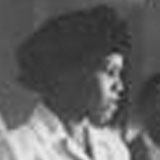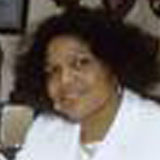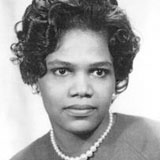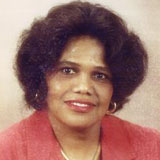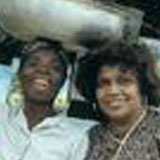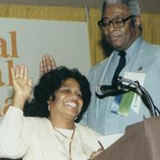Biography: Dr. Edith Irby Jones

Year: 1985
Achievement: Dr. Edith Irby Jones was the first woman to be elected president of the National Medical Association.
Year: 1948
Achievement: Dr. Edith Irby Jones was the first African American student to attend the University of Arkansas School of Medicine (now the University of Arkansas for Medical Sciences).
I was inspired to become a doctor with the death of my sister. I felt that if I had been a physician, or if there had been other physicians who would have been available, or if we had money adequately - which may not be true - that this physician would have come to us more frequently and that she would not have died.
In 1948, nine years before the "Little Rock Nine" integrated Central High School in Little Rock, Arkansas, Edith Irby Jones became the first black student to attend racially mixed classes in the South, and the first black student to attend the University of Arkansas School of Medicine. Her enrollment in a previously segregated southern medical school made news headlines across the nation.
Although Edith Irby had been accepted to attend classes at the University of Arkansas School of Medicine, she was not allowed to use the same dining, lodging, or bathroom facilities as other students. The daughter of a sharecropper and a domestic worker, Edith Irby was used to hardship. When she was five, she could not walk for eighteen months due to illness. When she was eight, her father died in a riding accident. Later, she lost a sister and other members of her family to typhoid.
Like many of her contemporaries, Edith Irby Jones was denied equal access to educational opportunities from childhood. But her abilities and talents were nurtured and supported by her family and the larger African-American community, leading her to believe that "you can do anything you want to do."
A high school teacher helped her get a scholarship to the historically black Knoxville College in Tennessee. After high school, African Americans in Little Rock and across Arkansas contributed to her medical school fund with dimes and quarters. High school alumni helped pay for her medical school tuition, while a similar effort sponsored by the black newspaper, the Arkansas State-Press, paid for her living expenses. Even the medical school's custodial staff supported her—placing a vase of fresh flowers on her table in the adjoining—and segregated—staff dining room every day. Jones, in turn, worked to help others, spending many nights traveling the state to help enlist members into the National Association for the Advancement of Colored People (NAACP). Jones recalled later that, while some white women in her class became good friends, her strongest support in medical school came from her husband, Professor James B. Jones, whom she met and married while she was a second-year medical student.
After receiving her M.D. in 1952, Jones practiced in her home town of Hot Springs, Arkansas, for six years. But she and her husband moved to Houston when the racial climate became sharply polarized. By then they had had two children, but Dr. Jones was determined to complete a residency in internal medicine at Baylor College of Medicine Affiliated Hospitals. The school welcomed her, but the hospital to which she was assigned segregated her and limited her patient rosters. She completed the last months of her residency at Freedman's Hospital in Washington, D.C. In 1962, she set up a private practice in inner city Houston, which continues to thrive today.
Throughout her career Dr. Jones passionately and steadfastly committed herself to social betterment, the poor, and her community. In 1985, she became president of the National Medical Association, established for black doctors who were not allowed to join the American Medical Association. She was also active in the American Medical Women's Association and Planned Parenthood, as well as other groups. In 1991, she sponsored the establishment of a medical clinic in Haiti.
Edith Jones received numerous awards and citations, most notably from the city of Houston and the State of Texas. In 1986, Houston honored her with Edith Irby Jones Day. In 1988, she was named American Society of Medicine Internist of the Year, and in 1998 the ambulatory center at the former Southeast Memorial Hospital was named in her honor.
In 1985, during her inaugural address as president of the National Medical Association, Jones stated: "We give little when we give only our material possessions. It is when we give of ourselves that we truly give—the long challenging hours with patients who can pay and those who cannot pay, the agony of sharing the hurts of families with the death of loved ones, the observations of dehumanizing effects of seeing the jobless, the crushed ambitions, and the sharing when all we have to hold on to is the 'being within' to inspire the young to take up our role. We have the comfort of knowing that our work is not to make a living but to make a life, not just for ourselves or a select few, but life with its fullness for all, and especially providing the access to health care, which is our special charge."
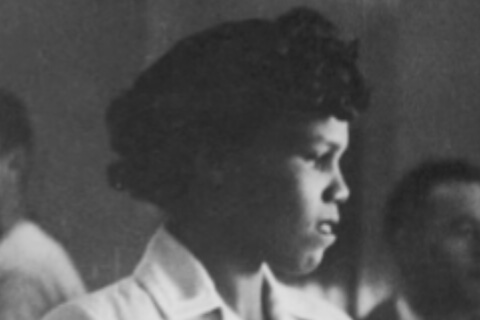
Dr. Edith Irby Jones
Dr. Edith Irby Jones
I really didn't think about when I applied to medical school that there was a possibility of my not being accepted. The University of Arkansas was one of the ones that was on my list to apply to. It didn't dawn on me that there might be a question about my race. It was close to home, but MOST of all why I accepted it- it had a tuition of 500 dollars. On the day of orientation, Dr. Schenalt, the dean at that time called me in and said, 'We have some situations. The state law requires us...' At that time, blacks and whites could not eat together in a public situation. They could not use the same toilet facilities, by state law. So I accepted that. I didn't have any choice. I was not trying to desegregate, I was not trying to change any laws, I felt... I just wanted a medical education. The kitchen help would always put on fresh flowers every day. A change of flowers, never the same. It either came from their yard, or from someplace, but always... never a word spoken, never an encouraging word saying, 'we're proud of you,' nothing said, nothing to say 'if you need help, come to us,' none of that. It was just a sort of unspoken, 'we are here.' The reason that I have stayed in Houston, and the reason that I have stayed in 'third ward' Houston, is because it allows me to do what I want to do. I see those who cannot afford to go to the other areas, even in Houston, to get medical care. I see those who cannot pay a parking fee because there is a charge for parking. I see people who are ashamed to go in and say, 'I don't have any money, but I'm sick.' People give me my passion. To be able to encourage someone who would not have achieved their potential. To be able to help the physical body to heal, that would not have been healed, or a family would have lost that member. To send someone off having the same feeling that I have-that the world is mine.




